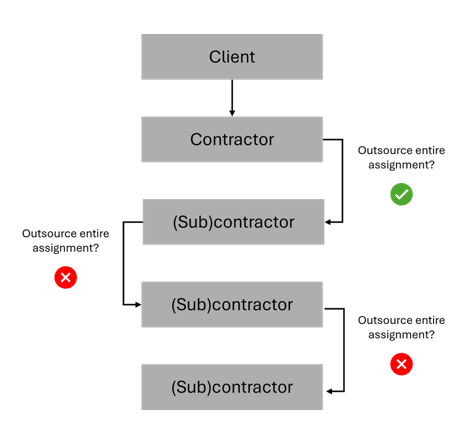Unpacking the Federal Coalition Agreement (2025-2029): Key Implications for the Real Estate Industry
With the recent formation of a new Belgian federal government, the real estate sector is facing some important changes. By breaking down the federal coalition agreement (2025-2029), we explore what to expect in the upcoming years.
Tax
The coalition agreement introduces several tax proposals, with one of the most talked-about being the capital gains tax on shares.
Changes to VAT rates. One of the key changes involves the expansion of the 6% VAT rate for demolition and reconstruction to the sale of newly built houses on plots where an existing building has been demolished. This move aims to phase out the current transitional system, ensuring that construction promoters and property developers don’t revert to the 21% rate after 30 June 2025. The Constitutional Court recently (2025) dismissed an appeal to annul these temporary transitional measures. The future regime will in principle be subject to the same basic conditions for demolition and reconstruction. In terms of social conditions, the current surface area requirement will be tightened to 175m², down from the previous 200m².
Another change is the temporary VAT rate reduction to 6% for the supply and installation of heat pumps, which will last for the next five years.
Renovation and renewal construction definitions. The government is planning to introduce (clear) definitions for renovation and renewal construction. In addition, it will examine to what extent a sustainability condition can be introduced. Whereas ‘renovation’ is particularly important for determining whether one would fall under the 6% VAT rate (renovation) or 21% (new construction), the concept of ‘renewal construction’ is important for determining whether or not the building can or should be sold with VAT. While this ambition is commendable, it remains to be seen whether the new definitions will fully resolve ongoing debates.
Battle against share deals. The government has committed to supporting the regions, if they wish, in their efforts to curb share deals in real estate. Exactly what measures the government has in mind, is not entirely clear. The reference to the regions likely focuses on the practice of avoiding payment of the sales duty by transferring shares instead of properties. At the moment, the regions have the so-called anti-abuse provision to regulate abuses; albeit that a share deal does not in itself constitute an abusive construction. Given the purely supportive aim, it is to be seen what the impact will be in practice.
Climate
The coalition agreement also includes several climate-focused proposals.
Access to EPC database for lenders. As banks are at the forefront of driving ESG (Environmental, Social, and Governance) initiatives, the government will assist by giving them access to the EPC (Energy Performance Certificate) database. This will further help banks integrate energy efficiency into their risk management and analysis. The government will also explore ways to make mortgage loans more accessible for properties with good energy performance.
Support co-owners' associations in the energy transition. The government aims to assist co-owners' associations in implementing energy-saving measures. Co-owners will be able to approve energy-related changes by a simple majority vote, compared to the current 2/3 majority for work on common areas. Additionally, the government encourages the creation of multi-year investment plans for climate-related projects and will look into making financing for energy-efficiency renovations more accessible to these associations.
Control of construction sites
Limiting subcontracting chains. The government is stepping up efforts to crack down on rogue subcontractors by reviewing subcontracting chains, particularly in terms of wage payments and social contributions. This follows the ban on “financial subcontracting” that came into effect on 1 January 2025. The goal is to reduce the complexity of subcontracting chains, which often make it difficult for inspectors to verify compliance.

With a view to increase safety and fair competition, it is no longer possible as a subcontractor to subcontract the entire performance of the contract or to retain only the coordination of the works.
The legislator gives in the explanatory note to this new law as an example of a permissible situation the contract in which a subcontractor retains only 1% of the work (and thus subcontracts 99%) to the extent that the 1% does not consist solely of coordination. It will be interesting to see how case law will deal with these situations. Note that, this prohibition only targets subcontractors. The (principal) contractor of the client can completely outsource its work. Any violation could result in imprisonment or fines.
Compulsory registration when leaving the construction site. To enhance safety and combat social dumping, the government will introduce a new requirement for subcontractors to register workers when leaving a construction site. This follows existing rules that require registration upon entering temporary or mobile construction sites. It is up to each (sub)contractor to register in advance the persons entering the construction site on his behalf.
B2B lease agreements
Expansion B2B unlawful terms. Since December 2020, a court can annul a contractual clause in a B2B contract if it creates a manifest imbalance between the rights and obligations of the parties. In addition to this general catch-all provision, there also exists a list of black and grey clauses. Whereas black clauses are always unlawful, grey clauses only have a presumption of unlawfulness.
There was an expectation these lists would disappear with the Civil Code reform. In turn, the lists have been expanded to include clauses in commercial cooperation agreements on retail sales in non-specialised shops where food and beverages predominate. An example of such a new (grey) clause is the presumption of unlawfulness for a clause that allows a party to end a commercial cooperation agreement on the basis of a resolutory clause.
The policy of expanding the lists continues. At the very least, the government wishes to prohibit clauses that allow a party to terminate the lease agreement for a breach of an obligation which does not impact the lease obligations themselves. For example, a brewer (lessor) could not (by himself) terminate a lease when the lessee does not fulfil its exclusive or minimum purchase obligation.
Where an unlawful clauses list has added value from an efficiency point of view, it may also have the effect of sanctioning perfectly justified situations. It therefore remains to be seen which clauses the government wishes to ban.
Consumers
Automatic condition precedent of financing in asset purchases by non-professionals. In property purchases, it is common for a sale to be conditioned on the buyer-consumer obtaining financing. To strengthen confidence in the real estate market, the government now aims to automatically include a condition precedent in favour of the consumer for obtaining the necessary credit in a property purchase contract. The absence of this condition would make the contract null and void.
It remains unclear exactly how this condition will be worded, what timeframes will apply, and how many lenders a consumer must approach. More generally, the discussion is part of the debate towards higher protection for consumers when buying property. On a side note, a similar bill died a quiet death in 2019 following a critical ruling by the Belgian Council of State. The upcoming new special contract law (see below, Civil Code reform) has not included a similar provision for property purchases.
Modification of housing construction law. The Housing Construction Law, better known as the Breyne Act, dates back to 1971. An update is long overdue. Recently, the European Commission challenged Belgium's completion guarantee rules in the Breyne Act, citing violations of the European Services Directive. The coalition agreement indicates a broader effort to modernise the Breyne Act to strengthen consumer protection, although the details remain vague: eliminate existing loopholes, strengthen enforcement by the economic inspection, and optimise and extend the professional ban.
Legal consumer protection for core and shell (‘casco’) projects and major renovation projects. Consumer protection in the context of core and shell projects and renovation projects was on the previous government's agenda. The Special Consultative Commission on Consumption already delivered an opinion on existing protection and possible expansion in 2023. At present, core and shell projects and renovation projects for consumers who want to rebuild or renovate fall outside the scope of the above-mentioned Breyne Act. As such, they do not benefit from the regulation on determining and paying the price and the rules on the guarantee. Today, however, it is unclear exactly what protection the government envisages, although it is likely that the Breyne Act principles will be applied as much as possible.
Ombudsman service. The previous government already announced that there would be a federal ombudsman service for all construction disputes between consumers and contractors/architects. The Building Reconciliation Commission would be expanded into a fully-fledged ombudsman service for this purpose. The government wishes to build further on this initiative.
Civil Code reform
New special contract law. Belgium’s Civil Code, dating back to 1804, is undergoing a long-awaited reform. A new book on extra-contractual liability came into effect on 1 January 2025, and further reforms are expected. In February 2025, a new special contract law (“Book 7”) was submitted to parliament (with entry into force at the earliest in 2026). Contrary to what the coalition agreement claims, no opinion from the Belgian Council of State is available today.
New legislation personal securities and statute of limitations. New legislation related to personal securities and a new statute of limitations is also being considered as part of the ongoing Civil Code reform.
Belgian Buildings Agency
Belgian Building Agency to reduce real estate portfolio. The Belgian Building Agency will be streamlining its property portfolio. The government plans to create an accessible inventory of the property assets, excluding strategic and sensitive sites. Unused properties will be reassigned or sold. This also includes reducing leased office space for federal departments by 15%, in response to the shift in working conditions. The government is also committed to making the entire property portfolio climate-neutral, with a focus on energy audits and collaboration with the private sector for DBFM projects (Design, Build, Finance, Maintain), where it makes financial sense.


